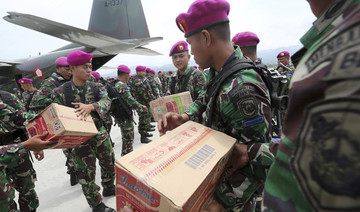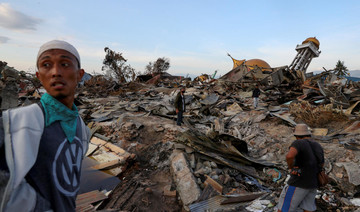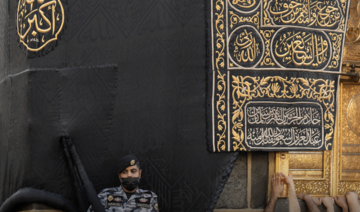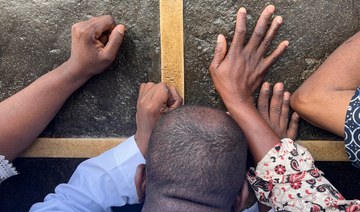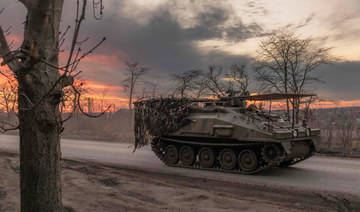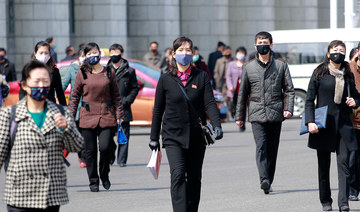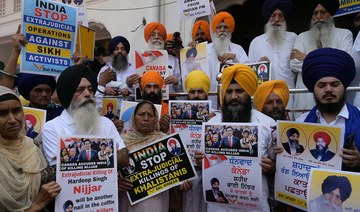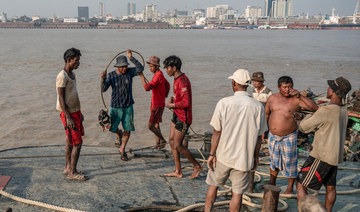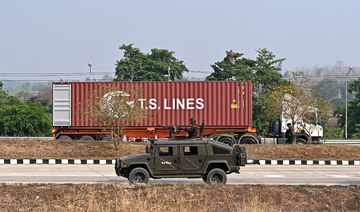PALU, Indonesia: Rescuers picking through the grim aftermath of Indonesia’s quake-tsunami issued a fresh public health warning Saturday as more decaying corpses were unearthed from beneath the ruined city of Palu.
More than a thousand people may still be missing in the seaside city on Sulawesi island, officials said, after the region was hit by a powerful quake and a wall of water, with the official death toll now at 1,571.
Hopes of finding anyone alive a full eight days since the disaster have all but faded, though Indonesian authorities have not officially called off the search for survivors.
There are fears that vast numbers of decomposing bodies could be buried beneath Petobo and Balaroa — two areas virtually wiped off the map — and authorities have warned survivors to steer clear as they brace for more macabre discoveries.
“Most of the bodies we have found are not intact, and that poses a danger for the rescuers. We have to be very careful to avoid contamination,” Yusuf Latif, a spokesman for Indonesia’s search and rescue effort, told AFP from Palu.
“We have vaccinated our teams, but we need to be extra cautious as they are exposed to health hazards. This is also a health concern for the public. It is very hard to control the crowd... People might be exposed to danger.”
At a massive government housing complex at Balaroa, where the sheer force of the quake turned the earth temporarily to mush, soldiers in face masks clambered over the giant mounds of mud, brick and cement.
The troops peeking under collapsed walls and peeling back corrugated sheets do not have to look hard.
Sergeant Syafaruddin, from an army unit in Makassar south of Palu, asks for a body bag to be brought across to a spot near where the remnants of an Islamic school now stands.
Two of his soldiers emerge from the ditch with the body bag sagging in the middle but looking too light to be a corpse — they say they found the heads of two adults and one child.
“There are no survivors here. We just find bodies, every day,” says Syafaruddin, who like many Indonesians goes by one name.
At another spot, a digger is called to turn over the devastated remains of a home. With almost no effort he unearths the body of a long haired lady buried in mud.
At the flattened Hotel Roa-Roa — where early optimism that survivors might be found faded as the days wore on and tropical heat intensified — search teams also prepared body bags.
Rescuers reviewed CCTV footage Saturday to get a sense of where the doomed guests could be buried beneath the impenetrable mountain of twisted rubble.
Survivors have ransacked shops and supply trucks in the hunt for basic necessities, prompting security forces to round up dozens of suspected looters and warn that they will open fire on thieves.
Hundreds of people Saturday rushed a truck carrying gas cylinders for cooking, with long and desperate queues quickly forming.
One supermarket that opened its doors refused to allow people inside, instead passing goods through the door as armed troops stood watch.
“We have not raised prices at all. However, we are not letting customers inside for safety reasons. The building survived the earthquake, but we don’t know how safe it is,” said Satria Hamid, a spokesman for the Transmart Carrefour supermarket.
Thousands of survivors continued to stream out of Palu to nearby cities in the aftermath of the disaster.
Hospitals remain overstretched and short on staff and supplies.
Project HOPE, a medical NGO, said only two of its 82 staff in Palu had reported for duty since the quake.
“We still don’t know the fate of the clinic doctors, nurses and technicians who usually staff the clinic,” the organization said in a statement.
A floating hospital run by the Indonesian navy and docked in Palu port has already assisted with the delivery of a baby, local media reported.
The United Nations said Friday it was seeking $50.5 million “for immediate relief” to help victims of the devastating quake and tsunami in Indonesia.
After days of delays, international aid is slowly making its way to the disaster zone, where the UN says almost 200,000 people need humanitarian assistance.
Indonesia had been reluctant to accept outside help at first but as the scale of the disaster became clear the government agreed to allow in foreign aid.
Getting vital supplies to the affected areas has proved hugely challenging, with the number of flights able to land at Palu’s small airport still limited, leaving aid workers facing gruelling overland journeys.
Oxfam had sent water treatment units and purification kits to Palu and Swiss aid teams on the ground were providing drinking water and emergency shelter, both said in statements Saturday.
Indonesia sits along the Pacific “Ring of Fire,” the world’s most tectonically active region, and its 260 million people are vulnerable to earthquakes, tsunamis and volcanic eruptions.
Disease fears as more bodies found in Indonesia disaster
Disease fears as more bodies found in Indonesia disaster
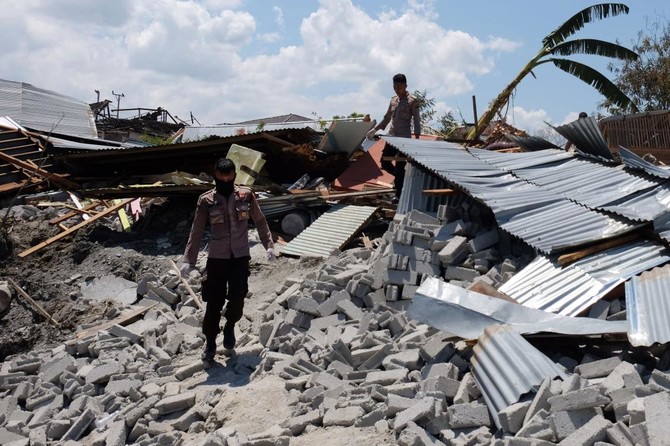
First Bangladeshi pilgrims ready to depart for Hajj
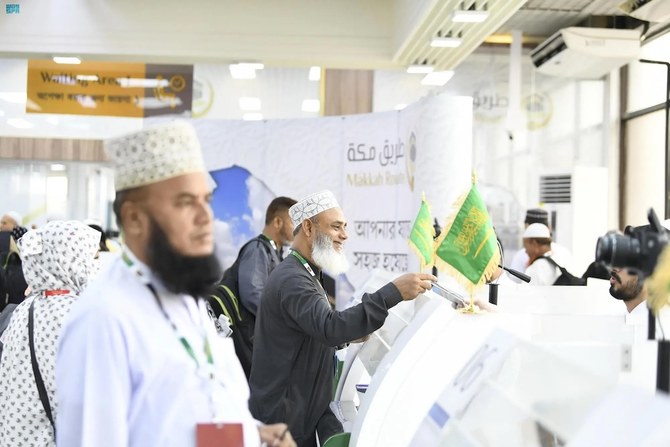
- The country’s quota this year is 127,000 pilgrims
- First flight leaves for Saudi Arabia on Thursday
DHAKA: Thousands of Bangladeshis are going to become some of the earliest Hajj pilgrims to arrive in Saudi Arabia this year, with the first batch scheduled to fly to Jeddah on Thursday.
This year, the Hajj is expected to start on June 14 and end on June 19.
While the pilgrimage itself can be performed over five or six days, pilgrims often arrive early, knowing that it may be a once-in-a-lifetime opportunity to fulfill their religious duty.
The first Hajj flight carrying 419 pilgrims is scheduled to leave for Jeddah from Hazrat Shahjalal International Airport in Dhaka on Thursday morning.
“Our pilgrims will be the first batch of Hajj pilgrims from around the world who will arrive in the Kingdom,” Mohammad Matiul Islam, additional secretary at the Ministry of Religious Affairs, told Arab News.
“Some pilgrims opt to travel earlier to the holy land, as it gives them spiritual peace. It’s the pilgrims’ choice to determine their time of travel.”
This year, Saudi Arabia granted Bangladesh a quota of 127,000 pilgrims to perform the spiritual journey that is one of the five pillars of Islam. Because of the rising cost of airfares to the Middle East, fewer Bangladeshis than expected will be able to go.
Bangladesh, one of the most populous Muslim-majority countries, also struggled to meet the quota in 2023, when the minimum government rate for Hajj was $6,000.
To prevent the same scenario during the 2024 pilgrimage season, the Bangladeshi government reduced the cost by $1,000, but high inflation at home prevented a third of prospective pilgrims from registering.
“As we fell short of meeting the number, a quota of 41,000 is surrendered to Saudi Arabia,” Islam said. “The surrendering of this (remaining slots) will not affect the receiving of our Hajj quota next year.”
Saudi visa registration for Bangladeshis will end on Saturday, and most of them will be departing over the next few weeks from Dhaka, where they will be assisted by Saudi authorities under the flagship Makkah Route initiative.
The pre-travel program was launched by the Kingdom in 2019 to help pilgrims to meet all the visa, customs and health requirements at their airport of origin, and save them long hours of waiting before and upon arrival in Saudi Arabia.
From Wednesday, those flying in the next few days can wait for departure at a special Hajj camp near the airport in Dhaka.
“While staying at the Hajj camp, the pilgrims have their Bangladeshi immigration part done. Also, a part of Saudi immigration is being done here as the pilgrims leave their luggage here to Makkah Route authorities,” Islam said.
“The air-conditioned accommodation here is free of cost for the pilgrims ... We suggest the pilgrims from outside Dhaka be at the Hajj camp two days before their flight. The camp can hold more than 5,000 pilgrims at a time.”
Russia warns French troops legitimate targets if they are sent to Ukraine

- French president Emmanuel Macron caused controversy in February by saying he could not rule out the deployment of ground troops in Ukraine in the future
MOSCOW: Russia warned France on Wednesday that if President Emmanuel Macron sent troops to Ukraine then they would be seen as legitimate targets by the Russian military.
Macron caused controversy in February by saying he could not rule out the deployment of ground troops in Ukraine in the future. The French leader warned that if Russia wins in Ukraine then Europe’s credibility will be reduced to zero.
“It is characteristic that Macron himself explains this rhetoric with the desire to create some kind of ‘strategic uncertainty’ for Russia,” Russian Foreign Ministry Spokeswoman Maria Zakharova told reporters.
“We have to disappoint him — for us the situation looks more than certain,” Zakharova said.
“If the French appear in the conflict zone, they will inevitably become targets for the Russian armed forces. It seems to me that Paris already has proof of this.”
Zakharova said Russia was already seeing growing numbers of French nationals among those killed in Ukraine.
Russia said on Monday it would practice the deployment of tactical nuclear weapons as part of a military exercise after what the Moscow said were threats from France, Britain and the United States.
AstraZeneca says withdraws Covid vaccine ‘for commercial reasons’

LONDON: British drugmaker AstraZeneca said Wednesday that it has withdrawn its Covid vaccine Vaxzevria, one of the first produced in the pandemic, citing “commercial reasons” and a surplus of updated jabs.
“As multiple, variant Covid-19 vaccines have since been developed there is a surplus of available updated vaccines. This has led to a decline in demand for Vaxzevria, which is no longer being manufactured or supplied,” an AstraZeneca spokeperson said.
3 Indian men charged with killing Sikh separatist leader in Canada appear in court
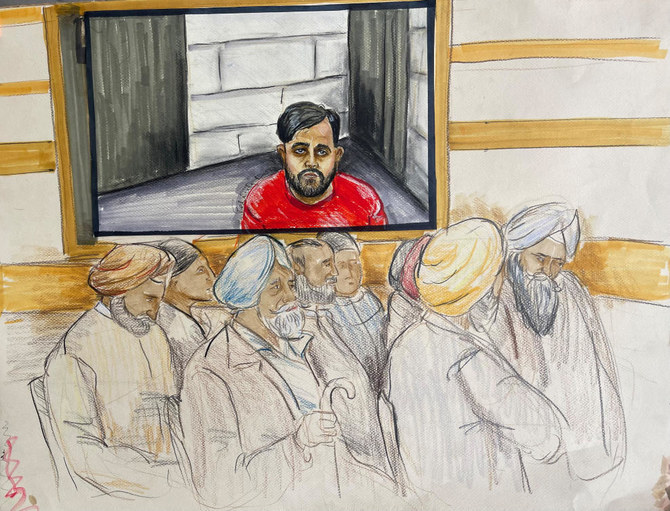
SURREY, British Columbia: Three Indian men charged with killing Sikh separatist leader Hardeep Singh Nijjar in British Columbia last year have appeared in court in the case that set off a diplomatic spat after Canadian Prime Minister Justin Trudeau said there were “credible allegations” of Indian involvement.
Canadian police had arrested the three Indian men last week in Edmonton, Alberta, and they have been charged with first-degree murder and conspiracy to commit murder.
Canadian Mounted Police Superintendent Mandeep Mooker said Friday that the investigation into whether the men had ties to India’s government was ongoing.
Nijjar, 45, was shot to death in his pickup truck last June after he left the Sikh temple he led in the city of Surrey. An Indian-born citizen of Canada, he owned a plumbing business and was a leader in what remains of a once-strong movement to create an independent Sikh homeland. India designated him a terrorist in 2020 and at the time of his death had been seeking his arrest for alleged involvement in an attack on a Hindu priest.
India has denied involvement in the slaying. In response to the allegations, India told Canada last year to remove 41 of its 62 diplomats in the country. Tensions remain but have somewhat eased since.
The arrested men — Kamalpreet Singh, 22, Karan Brar, 22, and Karanpreet Singh, 28 — appeared in court Tuesday via a video link and agreed to a trial in English. They were ordered to appear in British Columbia Provincial Court again on May 21.
Brar and Karanpreet Singh appeared in the morning. Kamalpreet’s appearance was delayed until the afternoon as he waited to speak to a lawyer.
The small provincial courtroom was filled with spectators during the morning session. Others crowded into an overflow room to watch the proceedings via video.
Richard Fowler, the defense lawyer representing Brar, said the case will eventually be moved to the Supreme Court and combined into one case.
About 100 people gathered outside the courthouse waving yellow flags and holding photos of Indian government officials whom they accuse of being involved in Nijjar’s killing.
Canadian police say the three suspects had been living in Canada as non-permanent residents.
A bloody decadelong Sikh insurgency shook north India in the 1970s and 1980s until it was crushed in a government crackdown in which thousands of people were killed, including prominent Sikh leaders.
The Khalistan homeland movement has lost much of its political power but still has supporters in the Indian state of Punjab, as well as in the sizable overseas Sikh diaspora. While the active insurgency ended years ago, the Indian government has repeatedly warned that Sikh separatists were trying to make a comeback.
UN: Myanmar displaced now at 3 million
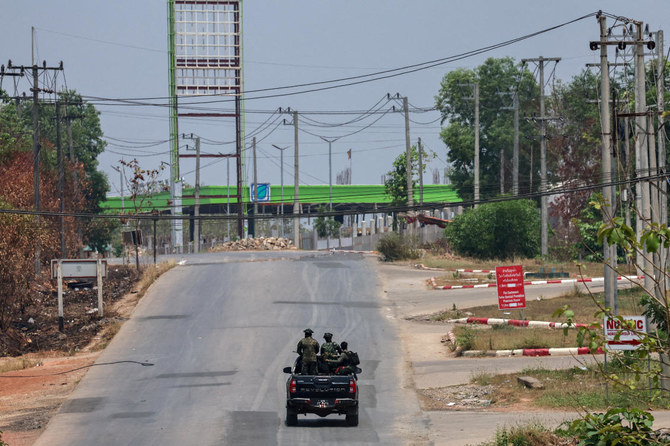
- An estimated one-third of those displaced are children, according to the UN statement
YANGON: The number of displaced people in Myanmar has reached three million, the United Nations said, the vast majority forced to flee their homes by conflict unleashed by the military’s 2021 coup.
Around 2.7 million have fled since the putsch that toppled Aung San Suu Kyi’s government after a short-lived experiment with democracy.
The coup sparked renewed clashes with established ethnic armed groups and birthed dozens of new “People’s Defense Forces” that the military has failed to crush.
“Myanmar stands at the precipice in 2024 with a deepening humanitarian crisis,” the UN’s resident coordinator in the country said in a statement released on Monday.
An estimated one-third of those displaced are children, according to the statement.
Around half of the three million have been displaced since late last year, when an alliance of ethnic armed groups launched an offensive across northern Shan state, the statement said.
The offensive seized swathes of territory and lucrative trade crossings on the China border, posing the biggest threat to the junta since it seized power.
Myanmar’s borderlands are home to a plethora of ethnic armed groups, many of whom have battled the military since independence from Britain in 1948 over autonomy and control of lucrative resources.
The UN said a severe funding shortfall was hampering its relief efforts, particularly ahead of the May-June cyclone season.
Last year cyclone Mocha smashed into western Myanmar’s Rakhine state, killing at least 148 people.
More than 355,000 people are currently displaced in western Rakhine state, which has been rocked since November by clashes between the Arakan Army and the military, the UN said.


